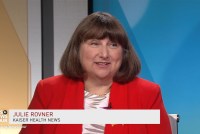Latest KFF Health News Stories
The Time Has Come for DIY Mandates on Covid
Yes, lots of us suffer from pandemic fatigue and have been getting sloppy about precautions in recent months. But with covid an ongoing menace — and governments reluctant to return to sweeping mandates — it’s time for all of us to step up our game.
The Debt Crisis That Sick Americans Can’t Avoid
The federal government is stepping in to assist student loan borrowers. But little public attention has been focused on what is — statistically, at least — a bigger, broader debt crisis in our country: An estimated 100 million people in the U.S., or 41% of all adults, are saddled with pernicious health care debt.
KHN chief Washington correspondent Julie Rovner discusses the Senate Democrats’ plans to let Medicare negotiate some drug prices, cap out-of-pocket drug costs for seniors, and fund enhanced subsides for ACA marketplace health plans.
To Retain Nurses and Other Staffers, Hospitals Are Opening Child Care Centers
More than two years into the pandemic, parents face a child care crisis. That’s why some hospitals are considering starting child care centers to address recruitment and retention troubles.
Citing a Mental Health Crisis Among Young People, California Lawmakers Target Social Media
Legislators are considering two bills that address online addiction among children by taking aim at website features such as push notifications and targeted posts. But Big Tech is fighting the effort, saying companies are already taking steps to protect children.
Journalists Detail the Scope of the Abortion Ruling, Monkeypox, and Public Health Powers
KHN and California Healthline staff made the rounds on national and local media this week to discuss their stories. Here’s a collection of their appearances.
Qué significa el caso de Nueva York para el fin de la polio
Para 2015, la polio se había erradicado casi por completo en todas partes excepto en Pakistán y Afganistán. Pero para 2020 se habían reportado casos en 34 países.
Hospices Have Become Big Business for Private Equity Firms, Raising Concerns About End-of-Life Care
Private equity firms are seeing opportunities for profit in hospice care, once the domain of nonprofit organizations. The investment companies are transforming the industry — and might be jeopardizing patient care — in the process.
What the Polio Case in New York Tells Us About the End of Polio
The Rockland County case isn’t expected to cause a major outbreak, but it shows how even this rare disease can pop up in undervaccinated communities.
KHN’s ‘What the Health?’: Manchin Makes a Deal
In a rare surprise for official Washington, Senate Majority Leader Chuck Schumer and Sen. Joe Manchin (D-W.Va.) announced a deal to expand the planned health bill in the Senate to include provisions raising taxes and addressing climate change. The measure would include a third year of expanded subsidies for the Affordable Care Act, but not health care coverage for people left out of Medicaid in states that failed to expand the program. Meanwhile, the ACA goes back to court, and the Biden administration restores anti-discrimination protections for LGBTQ+ people that were rolled back by the Trump administration. Joanne Kenen of the Johns Hopkins Bloomberg School of Public Health and Politico, Sarah Karlin-Smith of the Pink Sheet, and Alice Miranda Ollstein of Politico join KHN’s Julie Rovner to discuss these issues and more. Also this week, Rovner interviews Dr. Céline Gounder of KHN about the latest on the monkeypox outbreak.
La línea de salud mental 988 se expande, pero no demasiado en las zonas rurales
La línea 988 de National Suicide Prevention Lifeline, que se lanzó el 16 de julio, fue diseñada como una herramienta universal de apoyo a la salud mental para quienes llaman en cualquier momento y desde cualquier lugar.
Lo que debes saber sobre Paxlovid para tratar covid, en especial, ¿debes tomarlo?
Desde que Paxlovid comenzó a estar disponible hace siete meses, ha eclipsado otras terapias disponibles para prevenir los síntomas graves de covid en pacientes de alto riesgo. Algunos médicos se apresuran a recetarlo, pero como ocurre con tanto sobre la pandemia de covid, hay controversia.
The US Mental Health Hotline Network Is Expanding, but Rural Areas Still Face Care Shortages
On July 16, a three-digit number, 988, became the centerpiece of a nationwide effort to unify responses to Americans experiencing mental health crises. But many people, especially those in rural areas, will continue to find themselves far from help if they need more support than call operators can offer.
Watch: Navigating Social Media After Mass Shootings
A University of Pennsylvania professor shares advice on navigating the intersection of gun violence and social media as part of KHN’s new “Spotlight” interview series.
Everything You Need to Know About Paxlovid — Especially, Should You Take It?
Paxlovid has eclipsed other available therapies for preventing life-threatening covid symptoms in high-risk patients. But even as doctors praise its effectiveness, many say they have unanswered questions about prescribing the drug and want more and better data about it.
Nursing Homes Are Suing the Friends and Family of Residents to Collect Debts
Debt lawsuits — long a byproduct of America’s medical debt crisis — can ensnare not only patients but also those who help sick and older people be admitted to nursing homes, a KHN-NPR investigation finds.
Listen: Can California Lower the Price of Insulin?
California Healthline senior correspondent Angela Hart describes California’s ambitious plan to manufacture generic insulin under the state’s new “CalRx” drug label.
Health Insurance Price Data: It’s Out There, but It’s Not for the Faint of Heart
Health insurers and self-insured employer plans are now required to post their negotiated rates for almost every type of medical service. But navigating through the trove of information is no easy task.
The Ambulance Chased One Patient Into Collections
After a car wreck, three siblings were transported to the same hospital by ambulances from three separate districts. The sibling with the most minor injuries got the biggest bill.
To Stem the Spread of Monkeypox, Health Departments Tap Into Networks of Those Most at Risk
Although the disease is currently spreading almost exclusively among men who have sex with men, some cases are turning up in other populations — and that number is likely to grow if public health officials don’t effectively nip the outbreak in the bud.



















